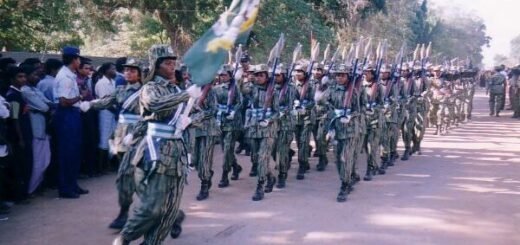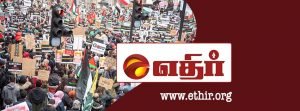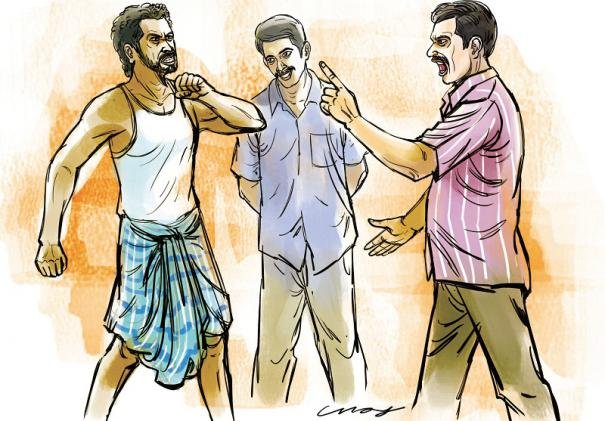A Dressing Down For JVP Anura
JVP Leader Fails To Satisfy London Meeting Seeking Answers
A late arrival was not enough to save JVP leader Anura Kumara Dissanayake from a barrage of questions. At a meeting held on Saturday 31 May in East Ham, London, organisers prevented the JVP from putting up their banners. This was not ‘a JVP propaganda meeting’ we were informed – and the organisers must be congratulated for showing the JVP for what it still is, a Sinhala nationalist organisation trying to hide behind Marxist rhetoric. But Anura himself was key to exposing this reality.
The JVP is incapable of organising a meeting of this kind anywhere outside Sri Lanka, hence they had to rely on others to organise the event. Not so surprisingly there is no way they can attract Tamils or Muslim minorities to their meetings. This, however, did not stop the JVP from boasting to the Sinhala media in Sri Lanka that they’d held ‘successful meetings internationally’. But the truth is somewhat on the contrary.
The JVP has been trying to revamp their war-tainted image by selecting a new leader and claiming to have changed. Relying on a bit of nationalism, they made a relatively successful comeback in the last provincial elections. However, their support among the Sinhala Diaspora remains very weak.
 The creation of the Frontline Socialist Party (FSP) and the international tour by its leader Kumar Gunaratnam has also done huge damage to the JVP. The aim of Anura’s visit, supposedly to recover from this, can without exaggeration be said to have failed.
The creation of the Frontline Socialist Party (FSP) and the international tour by its leader Kumar Gunaratnam has also done huge damage to the JVP. The aim of Anura’s visit, supposedly to recover from this, can without exaggeration be said to have failed.
The London meeting once more demonstrated the inability of the JVP to attract revolutionary sections of the community. Faced with questions, Anura resorted to diplomatic dodging rather than actually attempting to provide answers.
Anura had an opportunity to explain the mistakes of the past to his audience – the JVP’s false perspective that led them to enter a coalition with an anti-worker, capitalist government and to be complicit in the genocidal slaughter of Tamil-speaking people that took place in 2009. But, despite repeated probing, he touched on none of these issues. For Anura these issues may be in the long-forgotten past but they are firmly centred in the minds of many participants at the meeting.
The audience was told not to dwell on the past and instructed to ask questions about the current situation. But the attendees were well informed and the questions were not restricted to issues specifically of interest to Tamils.
Anura was bombarded with relevant questions for anyone concerned about political developments in Sri Lanka. What sort of government do you propose? What is ‘new socialism’? How can you attempt to explain the national question in four lines in your new propaganda pamphlet and say that you explained it in detail? How can you expect the support of minorities when you hand over the first copy of your pamphlet to Kandy Mahanayaka? Is it really ‘Marxist’ to make an appointment to discuss your manifesto with members of the Chamber of Commerce? Why do you still oppose the 13th amendment? Why don’t you campaign against the divisive BBS? Do you respect the national rights of Muslims?
They went on: Why don’t you have a single line about the trade unions in your ‘new vision’ pamphlet? Given all the attacks on working rights and public services, what about organising a united struggle and mobilising the trade unions for it? What about language rights? Do you support the international investigation into war crimes? And so they came, thick and fast. Apart from one person who challenged the question of trade unions, absurdly dismissing this relevant query as ‘rhetoric’, Anura received no support from the audience.
Anura received a real dressing down. He appeared nervous; he struggled to answer many of the questions, skipping over a number. But he made it clear that the JVP will never back down from opposing the 13th amendment in the name of defending a ‘unitary state’. Furthermore, he ridiculously claimed that there is no need for a state language – only a national language exists.
The one clear message Anura gave is that the JVP has nothing to offer working class and young Tamils facing oppression on many fronts. Despite claiming that the JVP stands for a separation of religion and state, they also have nothing to offer ordinary Muslims. The BBS is a creation of the state so we must oppose the state, Anura claimed.
This was shockingly disappointing to those anti-BBS campaigners in the audience who oppose both the butcher Mahinda Rajapaksa and the BBS and don’t want to postpone struggle against this vicious force until the JVP establishes socialism in Sri Lanka! Anura even claimed that the JVP would support the Chinese regime as opposed to ‘imperialism’. From this point of view he completely dismissed any possible inquiry into the war crimes. The JVP is not concerned with a return to any sort of mass struggle politics. As an audience member pointed out, with these views and tactics the JVP does huge damage to the left in general.
One thing was clear: if Anura could not even slightly convince a crowd, largely made up of activists, gathered at a London meeting, he has a cat in hell’s chance of getting a hearing among ordinary folk in Sri Lanka. The problem of the absence of a powerful organisation that can answer these important questions and give a lead to the oppressed Tamils, Muslims, workers and poor in Sri Lanka remains to be solved. At least this meeting showed that the JVP, even with its new leadership, can be crossed off the list.


















